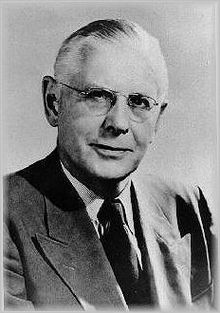Get Today in Masonic History into your Inbox. Sign up today for one of our email lists!
Need an article for your Trestleboard/Newsletter see our Use Policy
Leslie Miscampbell Frost Passes Away

Today in Masonic History Leslie Miscampbell Frost passes away in 1973.
Leslie Miscampbell Frost was a Canadian politician.
Frost was born in Orilla, Ontario, Canada on September 20th, 1895. He attended the University of Toronto and Osgoode Hall Law School. During World War I he served with the 157th Battalion "Simcoe Foresters", Canadian Expeditionary Force (CEF) and the 20th Battalion Queen's York Rangers in Belgium and France. In 1918 he was wounded in battle and discharged as a captain.
In 1921, Frost was called to the Bar. Frost and his brother lived in Lindsay, Ontario commuted daily to their law practice in Pleasant Point, Ontario by steamer up Sturgeon Lake.
In 1937, Frost entered politics when he was elected to the Ontario legislature. After his initial win, he never lost an election. During his time in the legislature he was the Treasurer of Ontario and the Minister of Mines. Frost was chosen as the leader of the Ontario Progressive Conservative Party and dubbed "Old Man Ontario" and "The Laird of Lindsay." He became Premier of Ontario in 1949. He led the province as Premier during the economic boom of the 1950's. His low key approach also earned him the nickname "The Great Tranquilizer." He served as Premier of Ontario until 1961.
During his time as Premier he saw the expansion of government in the province in healthcare, highways and schools. His government substantially increased the public investment in the economy. Under his leadership Ontario built the 400 series of highways. He also tried to take control of the income tax from the federal government. He failed to implement a sales tax in the province. In education the number of universities increased from 4 to 12. In 1943 the provinces investment in education was $13 million. By the time Frost retired as Premier, the province was spending $250 million on education.
Frost was also active on the Civil Rights front in Ontario. His government was the first to pass laws providing penalties for racial, ethnic, and gender discrimination on private property under the Fair Employment Practices Act and Fair Accommodation Practices Act. The year after he left office, the civil rights movement he started in Ontario brought the Ontario Human Rights Code into existence. His government also introduced voting rights for First Nations, the indigenous people of Canada.
Frost's government also oversaw the federation of old City of Toronto with twelve surrounding municipalities to form Metropolitan Toronto.
After Frost retired in 1961, he remained active with various activities including serving on the Board of Governors of the University of Toronto, as well as a member of the Board of Directors of the Bank of Montreal, Canada Life, and Trans Canada Air. He also served as Vice President of the Champlain Society, named after the explorer Samuel D. Champlain, the organization seeks to advance knowledge of Canadian history through the publication of scholarly books (both digital and print) of primary records of voyages, travels, correspondence, diaries and governmental documents and memoranda. He also worked to protect public lands and in his final interview declared himself an environmentalist.
Frost was also a fan of United States history, particularly the American Civil War. On his mantle he had a piece of wood allegedly from President Abraham Lincoln's childhood log cabin home.
Frost passed away on May 4th, 1973.
Frost was a member of Faithful Brethren Lodge No. 77 in Lindsay, Ontario. He was also a member of Moore Consistory, Ancient Accepted Scottish Rite in Hamilton, Ontario.
This article provided by Brother Eric C. Steele.

